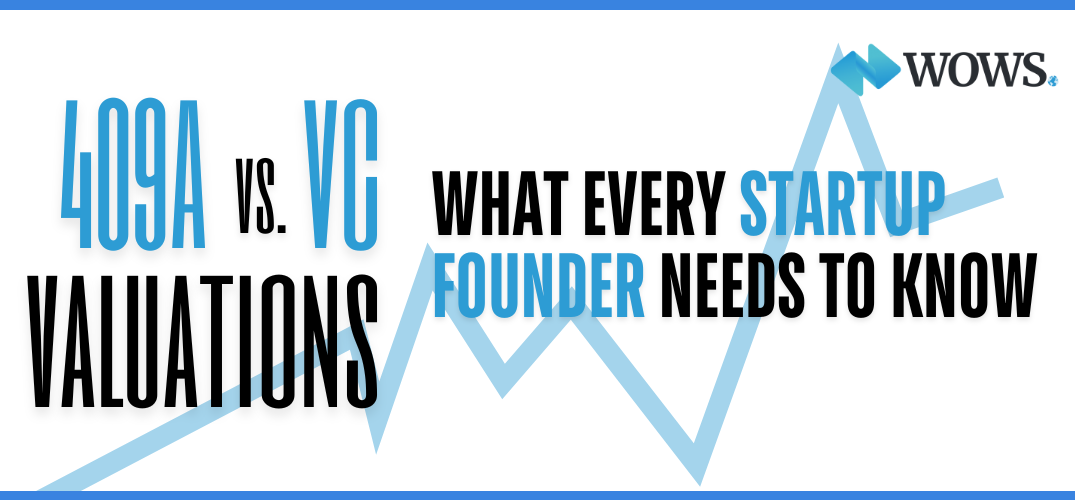409A Valuation vs. VC Valuation: What Every Startup Founder Needs to Know
409A Valuation VC valuation Startup Fundraising Post Money Valuation 4 minutes

As a startup founder, you're used to multitasking: building your product, pitching to investors, and attracting top talent. But when you start offering stock options to your employees, things can get a little trickier. Navigating the complex world of valuations is essential, especially if you're offering equity to employees in the U.S. or raising funds from venture capitalists (VCs).
You’ll come across two important types of valuations: the 409A valuation, required for U.S. tax compliance, and the VC valuation, used to negotiate with investors. Both are critical, but they serve very different purposes. Let's break it down—and we’ll throw in some real-world examples to make it stick.
What Exactly is a 409A Valuation?
Imagine you're the founder of a fast-growing startup in Dubai, offering stock options to attract top talent. To stay compliant with U.S. tax regulations, you must determine the fair market value (FMV) of your company’s common stock through a 409A valuation. This valuation, conducted by a third party, ensures you aren’t giving out stock options at unfairly low prices. It helps protect your company and employees from penalties down the road.
For example, Careem, a ride-hailing service based in Dubai (which Uber later acquired for $3.1 billion), likely had to conduct a 409A valuation to remain compliant with U.S. tax laws. When Careem issued stock options to employees, the 409A valuation helped determine the fair exercise price. A lower valuation would have allowed employees to exercise their stock options at a more favorable rate, offering greater potential returns when the company later sold at a high price.
What About VC Valuation?
On the flip side, a VC valuation is what investors use to determine how much your company is worth before they put in money. Think of this valuation as the figure you negotiate with your investors—one that helps them decide how much equity they will take in exchange for their capital.
Take the case of Grab, Southeast Asia’s super app. When Grab raised $300 million from Toyota back in 2018, the company's VC valuation was based on its market position, growth potential, and projected cash flows. The valuation had nothing to do with IRS tax compliance—it was all about convincing investors that the company would deliver future returns.
VC valuations are more subjective, relying on factors like market trends, industry comparisons, and the growth trajectory of similar companies. In Grab’s case, investors were betting on the booming ride-hailing industry in Southeast Asia, and that speculative bet paid off when Grab went public through a SPAC deal in 2021 at a valuation of $40 billion.
Real-World Impact: Why This Matters for Founders
Understanding these valuations is crucial if you want to avoid pitfalls and seize opportunities. Let’s say your company has a low 409A valuation but a high VC valuation. This scenario can actually work in your favor. Employees get to buy stock at a lower price, making their equity more valuable if the company grows. Meanwhile, the higher VC valuation reflects your company’s future potential, attracting investor interest and funding.
Take Bukalapak, an Indonesian e-commerce unicorn. Before its 2021 IPO, the company likely had a lower 409A valuation when granting stock options to employees. However, when it raised $1.5 billion in its public offering, the company’s VC valuation skyrocketed. The key takeaway? A low 409A valuation doesn’t mean your company is worth less—it just offers more favorable terms for employees while the VC valuation determines how much investors are willing to pay for your growth potential.
Key Differences Between 409A and VC Valuations
Here’s a snapshot of how these valuations differ and why both matter:
Real-Life Example: Southeast Asia vs. U.S. Valuation Models
Let’s dive into a more specific comparison. A startup in Singapore might have its 409A valuation done at the same time it’s negotiating with VCs for a new funding round. In Singapore, where the startup ecosystem is less regulated by U.S. standards, the 409A valuation might not seem as crucial unless you have U.S.-based employees. However, failing to get it done could cost you later, especially if the U.S. IRS steps in during a potential exit or acquisition.
Consider GoTo, the merged Indonesian ride-hailing giant. When GoTo was in its pre-IPO stage, the company had to balance VC valuations (focused on raising capital for growth) and 409A valuations (to ensure employee stock options were priced fairly). Despite these complex layers, GoTo's VC valuation reflected the startup's market dominance in Indonesia, leading to a highly successful public listing.
When a Low 409A Valuation is Good News
A common worry for founders is that a low 409A valuation means their company is undervalued. But this couldn’t be further from the truth. In fact, a low 409A valuation can be a huge advantage. Your employees get stock options at a lower price, meaning they stand to gain more if your company takes off. This was the case for Sea Group, a Singapore-based gaming and e-commerce giant. When Sea Group started offering stock options, a low 409A valuation likely enabled their early employees to purchase shares at a favorable price. As Sea Group grew and went public, those employees saw massive gains.
On the other hand, a high VC valuation doesn’t directly impact the 409A valuation—it’s based on investor expectations of your company’s future potential, not its current FMV.
Post-Money Valuation vs. 409A: What’s the Difference?
Finally, let’s talk about post-money valuation, a concept many founders confuse with 409A. Simply put, a post-money valuation reflects the value of your company after receiving funding. It’s critical in determining how much equity you’ll give up to investors during a fundraising round.
For example, if you raise $10 million at a $50 million pre-money valuation, your post-money valuation will be $60 million. This figure helps you and your investors understand the equity distribution. In contrast, a 409A valuation is an internal, compliance-driven process that sets the fair value of common stock for your employees.
Wrapping Up: What Every Founder Should Know
Understanding the differences between 409A and VC valuations can help you navigate your company’s financial journey more effectively. Whether you’re building a fintech startup in Singapore or scaling a SaaS company in Dubai, both valuations play crucial roles. A 409A valuation ensures you’re compliant with tax laws and offers stock options at fair market value. A VC valuation, on the other hand, helps attract investors by showcasing your growth potential.
By mastering these two valuation processes, you’ll be better equipped to reward your team, raise capital, and set your company up for long-term success.
About WOWSGlobal
At WOWS Global, we’re dedicated to empowering startups and scaling companies. Our platform connects founders with investors, offering seamless access to capital, expert insights, and tools that make it easier to navigate complex funding processes. Whether you're raising funds, managing valuations, or exploring new markets, WOWS provides the support you need to accelerate growth and achieve your business goals.
Ready to dive deeper into 409A valuations for your startup? Visit our 409A Valuation Services page for more detailed insights and personalized assistance. If you have questions or want to get started, schedule a free consultation with our team today! We're here to help you navigate the complexities of startup valuations with confidence.
Related Posts
-

Fundraising 409A Valuation Cap Table Management Investor 3 Minutes
WTF Is 409A and Why Should I Care?
Learn what a 409A valuation is, why it matters for employee stock options and how it impacts founders, investors, taxes and diligence, plus how WOWS Global can help. -

Startup & Venture Capital Southeast Asia startups Southeast Asia SEA Startup Fundraising 6 Minutes
Inside the WOWS Investor Network: 250+ VC’s and Funds Powering SEA’s Startup Surge
This article unpacks the investor network behind WOWS Global from megafunds to niche co-investors and how this platform helps founders raise smarter, faster. See who’s in the network, what kind of capital they bring, and why this matters when you’re scaling across SEA. -

Startup Fundraising 409A Valuation Financial Model Pitch Deck 5 minutes
Case Study: MedTech Startup in Southeast Asia Raises $3 Million USD with WOWS Global’s Premier Package
A Southeast Asia-based MedTech startup successfully raised $3M in Series A funding using WOWS Global’s Premier Package. Learn how our full-service fundraising solution helped them secure new investors and reinvestment from existing backers. -

409A Valuation Post Money Valuation Fair Market Value 3 minutes
Case Study: Comprehensive 409A Valuation for FinTech Solutions Group
Learn how WOWS Global provided FinTech Solutions Group with a detailed and accurate 409A valuation, ensuring compliance and supporting strategic financial planning. -

409A Valuation
What is a 409A valuation?
A 409A valuation is a critical component in determining the fair market value (FMV) of your company's stock options. It is named after section 409A of the Internal Revenue Code (IRC), which was introduced in 2004 to regulate the valuation of non-qualified deferred compensation plans. The purpose of a 409A valuation is to ensure that employees are not granted stock options at a price below fair market value, which would result in tax consequences for both the employee and the company. -

409A Valuation Startups
Understanding 409A Valuation to Unlock the Value of Your Startup
Startups are always looking for new ways to increase their value and attract investors. Understanding the significance of 409A valuation is one way to accomplish this. A 409A valuation is required for startups that give their employees equity-based compensation, such as stock options, and it determines the fair market value of the company's common stock.
